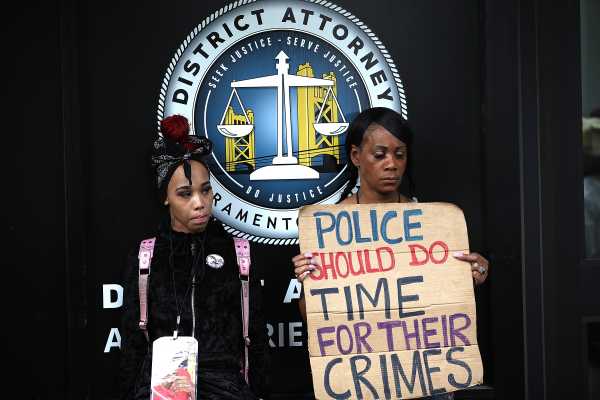
When police shot and killed unarmed Sacramento resident Stephon Clark in March as he stood in his grandparents’ backyard, it sparked protests and outrage.
Two months later, Clark’s death is still having political ramifications.
California senator and rumored 2020 presidential candidate Kamala Harris announced on Monday that she will endorse Noah Phillips, a reform-minded attorney who has pledged to fight racial inequality and called for police reform in the wake of Clark’s death, in the Sacramento County district attorney’s race.
Phillips is running against incumbent district attorney Anne Marie Schubert, who has faced heavy criticism for accepting money from a police union days after the Clark shooting and for her failure to swiftly charge the police officers who shot Clark. Her office is still investigating the shooting and has argued that Phillips is politicizing Clark’s death.
The county will hold a nonpartisan primary on June 5, but because Schubert and Phillips are the only candidates, the primary election will also determine the winner.
Critics say that Schubert won’t hold law enforcement officers accountable for misconduct, and a member of the Sacramento City Council recently rescinded his endorsement of Schubert, explaining that he needed to be convinced that Schubert would deal with criminal justice issues fairly.
Clark was unarmed, standing in his grandparents’ backyard, and holding a cellphone when police shot and killed him on March 18. The incident has reignited national discussions about race and police use of force and spurred protests in Sacramento and other cities.
Phillips has also received support from prominent Democratic backer George Soros, who in recent years has put considerable money behind electing local prosecutors and politicians that want to address racial bias in the criminal justice system. Due to the power of elected prosecutors, district attorney races have become a key target for communities and racial justice activists frustrated with police shootings and other issues.
Harris’s endorsement of Phillips is not the first time she has commented on the Clark shooting. But it serves as another reminder that the senator sees policing and criminal justice issues as a key way to make her mark.
Harris on Stephon Clark: “A life that should not have been ended”
Back in April, Harris addressed the problem of fatal police shootings of black men and women at a town hall in Sacramento, saying that Stephon Clark shouldn’t have died.
“There is no question that that was a life that should not have been lost,” she told a crowd of several hundred gathered at a local church. “That is a life that should not have been ended.”
An independent autopsy found that police shot at Clark 20 times after they mistook his cellphone for a weapon. He was hit eight times, mostly in his back. Benjamin Crump, the lawyer representing Clark’s family, has said that the autopsy “contradicts the police narrative that we’ve been told.”
However, an autopsy released on May 1 by the Sacramento County coroner called the family’s findings “erroneous” and said that Clark was hit seven times — and that only three shots entered his back. Both sides have maintained that their respective autopsies are correct.
Harris has repeatedly spoken out about criminal justice issues. She served as California’s attorney general from January 2011 to the beginning of 2017 and has focused heavily on criminal justice and policing issues since she was first elected to the Senate in 2016. She is only the second black woman to serve in the Senate.
However, Harris has faced criticism herself, while leading the California Justice Department, for being too soft on law enforcement. Some of her biggest critics were black lawmakers, who were hoping she would enact stricter laws on police oversight.
In 2015, Harris did not back legislation that would have required her office to independently investigate fatal police shootings, arguing that local district attorneys were better equipped to handle the matter.
The Stephon Clark incident follows several high-profile police shootings of black men in recent years, and several studies have shown that there are significant and persistent racial disparities in police use of force.
Sourse: vox.com






